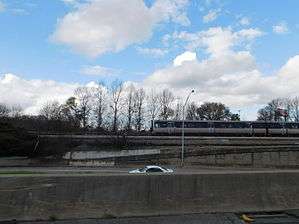Gold Line (MARTA)

| Gold Line | |
|---|---|
|
| |
| Overview | |
| Type | rapid transit |
| System | Metropolitan Atlanta Rapid Transit Authority |
| Status | operational |
| Locale | Atlanta, Georgia |
| Termini |
Doraville (northeast) Airport (south) |
| Stations | 18 (4 Northeast, 6 North, Five Points, 7 South) |
| Operation | |
| Opened | 1981 |
| Operator(s) | MARTA |
| Rolling stock | CQ310, CQ311, CQ312 |
| Technical | |
| Track gauge | 1,435 mm (4 ft 8 1⁄2 in) |
| Electrification | third rail |
| Highest elevation | at grade, elevated, underground |
Red & Gold Lines | |||||||||||||||||||||||||||||||||||||||||||||||||||||||||||||||||||||||||||||||||||||||||||||||||||||||||||||||||||||||||||||||||||||||||||||||||||||||||||||||||||||||||||||||||||||||||||||||||||||||||||||||||||||||||||||||||||||||||||||||||||||||||||||||||||||||||||||||||||||||||||||||||||||||||||||||||
|---|---|---|---|---|---|---|---|---|---|---|---|---|---|---|---|---|---|---|---|---|---|---|---|---|---|---|---|---|---|---|---|---|---|---|---|---|---|---|---|---|---|---|---|---|---|---|---|---|---|---|---|---|---|---|---|---|---|---|---|---|---|---|---|---|---|---|---|---|---|---|---|---|---|---|---|---|---|---|---|---|---|---|---|---|---|---|---|---|---|---|---|---|---|---|---|---|---|---|---|---|---|---|---|---|---|---|---|---|---|---|---|---|---|---|---|---|---|---|---|---|---|---|---|---|---|---|---|---|---|---|---|---|---|---|---|---|---|---|---|---|---|---|---|---|---|---|---|---|---|---|---|---|---|---|---|---|---|---|---|---|---|---|---|---|---|---|---|---|---|---|---|---|---|---|---|---|---|---|---|---|---|---|---|---|---|---|---|---|---|---|---|---|---|---|---|---|---|---|---|---|---|---|---|---|---|---|---|---|---|---|---|---|---|---|---|---|---|---|---|---|---|---|---|---|---|---|---|---|---|---|---|---|---|---|---|---|---|---|---|---|---|---|---|---|---|---|---|---|---|---|---|---|---|---|---|---|---|---|---|---|---|---|---|---|---|---|---|---|---|---|---|---|---|---|---|---|---|---|---|---|---|---|---|---|---|---|---|---|---|---|---|---|---|---|---|---|---|---|---|---|---|---|---|---|---|
Legend | |||||||||||||||||||||||||||||||||||||||||||||||||||||||||||||||||||||||||||||||||||||||||||||||||||||||||||||||||||||||||||||||||||||||||||||||||||||||||||||||||||||||||||||||||||||||||||||||||||||||||||||||||||||||||||||||||||||||||||||||||||||||||||||||||||||||||||||||||||||||||||||||||||||||||||||||||
| |||||||||||||||||||||||||||||||||||||||||||||||||||||||||||||||||||||||||||||||||||||||||||||||||||||||||||||||||||||||||||||||||||||||||||||||||||||||||||||||||||||||||||||||||||||||||||||||||||||||||||||||||||||||||||||||||||||||||||||||||||||||||||||||||||||||||||||||||||||||||||||||||||||||||||||||||
The Gold Line is a rapid transit line in the MARTA rail system. It operates between Doraville and Airport stations, running through Doraville, Chamblee, Atlanta, East Point and College Park.
The Gold Line was previously called the Northeast-South Line until MARTA switched to a color-based naming system in October 2009. The North-South Line, from its launch, was considered one line (denoted with the Orange Line color on old system maps) until 2006 when the North Branch and the Northeast branch were redesignated as the North-South Line (the current Red Line) and the Northeast-South Line (the current Gold Line). Technically, with the 2009 designation change, there is no longer a mention of the color orange for the line.
The rail line was part of the initial MARTA north-south rail service in 1981. The first segment ran from the Garnett to the North Avenue stations, although the Peachtree Center opened the year after as an infill. In 1982, it expanded north to Arts Center, and in 1984, expanded as far north as Brookhaven and as far south as Lakewood/Fort McPherson. The East Point station opened, extending the line two miles to the south. A little more than a year later, the Chamblee station began service and served as the temporary terminus of the North Line. In 1988, the Airport station opened, and became the terminus of the South Line. In 1992, the North-South Line was extended northward to its current terminus at Doraville. In 1996, MARTA extended North Line services to Dunwoody. This created two branches of the North Line, and the Doraville branch was redesignated as the Northeast Line to avoid confusion. It finally extended north to its current terminus at North Springs in 2000.
Now known as the Gold Line, it shares trackage with its counterpart, the Red Line, between Airport and just north of the Lindbergh Center.
Naming controversy
When the color-based name change was proposed, it was the Yellow Line at first. However, in February 2010, the name was revised to Gold in order to address a concern among the Asian-American residents along the rail corridor.[1] The section of the Gold Line that is not shared by the Red Line has a significant number of Asian-American residents, to whom the term "yellow" is considered derogatory.[1]
Stations
listed from northeast to south
| Station | Code | Opened | Rail Line Transfer |
|---|---|---|---|
| Doraville [2] | NE10 | 1992 | |
| Chamblee | NE9 | 1987 [3] | |
| Brookhaven/Oglethorpe [4] | NE8 | 1984 | |
| Lenox [5] | NE7 | 1984 | |
| Lindbergh Center [6] | N6 | 1984 | |
| Arts Center [7] | N5 | 1982 | |
| Midtown [8] | N4 | 1982 | |
| North Avenue [9] | N3 | 1981 | |
| Civic Center [10] | N2 | 1981 | |
| Peachtree Center [11] | N1 | 1982 [12] | Atlanta Streetcar access |
| Five Points [13] | 1981* [14] | [15] | |
| Garnett [16] | S1 | 1981 | |
| West End[17] | S2 | 1982 | |
| Oakland City [18] | S3 | 1984 | |
| Lakewood/Fort McPherson [19] | S4 | 1984 | |
| East Point [20] | S5 | 1986 | |
| College Park [21] | S6 | 1988 | |
| Airport | S7 | 1988 [22] | [23] |
- Note: The East-West (now Blue/Green Line) platform opened in 1979.
References
- 1 2 Ariel Hart (2010-02-11). "MARTA changes "yellow" line to "gold"". Atlanta Journal-Constitution. Retrieved 2010-02-11.
- ↑ "http://itsmarta.com/ne-dor-overview.aspx"
- ↑ "http://itsmarta.com/ne-cha-overview.aspx"
- ↑ "http://itsmarta.com/ne-bro-overview.aspx"
- ↑ "http://itsmarta.com/ne-len-overview.aspx"
- ↑ "http://itsmarta.com/ne-lin-overview.aspx"
- ↑ "http://itsmarta.com/ns-art-overview.aspx"
- ↑ "http://itsmarta.com/ns-mid-overview.aspx"
- ↑ "http://itsmarta.com/ns-nor-overview.aspx"
- ↑ "http://itsmarta.com/ns-civ-overview.aspx"
- ↑ "http://itsmarta.com/ns-pea-overview.aspx"
- ↑ "Peachtree Center Station Tour https://www.youtube.com/watch?v=2DDOKOpKmJA"
- ↑ "Five Points Station Tour: https://www.youtube.com/watch?v=gkLKot2vk3Y"
- ↑ "Five Points Station Tour: https://www.youtube.com/watch?v=gkLKot2vk3Y"
- ↑ "Five Points Station http://itsmarta.com/ns-fiv-overview.aspx"
- ↑ "http://itsmarta.com/ns-gar-overview.aspx"
- ↑ "http://itsmarta.com/ns-wes-overview.aspx"
- ↑ "http://itsmarta.com/ns-oak-overview.aspx"
- ↑ "http://itsmarta.com/ns-lak-overview.aspx"
- ↑ "http://itsmarta.com/ns-eas-overview.aspx"
- ↑ "College Park Station http://itsmarta.com/ns-col-overview.aspx"
- ↑ "Airport Station Tour https://www.youtube.com/watch?v=wNcj6GOTen0"
- ↑ "Airport Station http://itsmarta.com/ne-air-overview.aspx"
- ↑ "http://itsmarta.com/ne-overview.aspx"